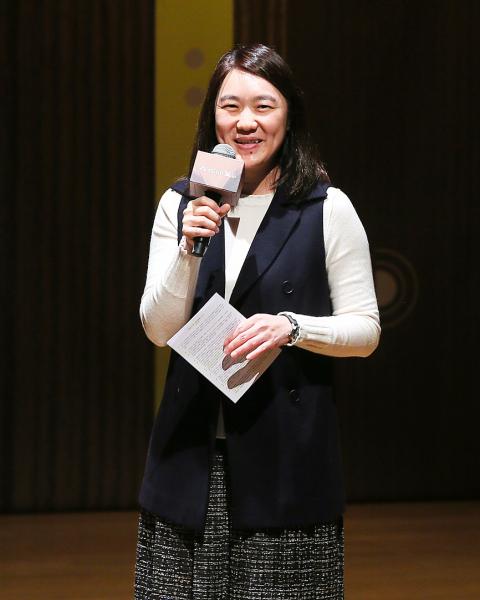Eslite Spectrum Corp (誠品生活), which runs the Eslite bookstore chain (誠品書局) and other businesses at home and abroad, is mulling opening new outlets in Southeast Asia, although bookstore operations remain unprofitable, chairwoman Mercy Wu (吳旻潔) said yesterday.
The Taipei-based conglomerate is studying the possibility of making inroads in Southeast Asia in line with plans to strengthen its cultural innovation business, including 50 bookstores in Taiwan, Hong Kong, China and Japan, Wu said.
“Today, profitability continues to pose the biggest challenge for Eslite as it turns 30 years old this year,” Wu told a news conference in Taipei, while announcing the bookstore chain’s annual report on reading behaviors and market trends.

Photo: CNA
Wu, who took over the company’s reins in 2017 after the sudden death of her father, Robert Wu (吳清友), said that the bookstores had to increase capital by NT$2 billion (US$65.56 million) over the years to stay in business.
The company has identified 100 sources of losses, but has yet to find a profitable business model, she said, adding that no enterprise in the world can live off running bookstores as its core operation.
Eslite Spectrum also runs department stores and restaurants, and sells appliances and equipment for hotels, restaurants, kitchens and wine cellars.
Malaysia appears the most likely venue, as 25 percent of its population is ethnic Chinese, making expansion easier, Mercy Wu said.
Hopefully, the bookstore chain can cast off its “unprofitable” shackles to prolong its existence, Mercy Wu said, adding that she is to keep the passion for cultural business alive.
Eslite Spectrum reported that consolidated revenue increased 18.14 percent year-on-year to NT$4.31 billion in the first 10 months of this year.
In the first three quarters, net income fell 29.31 percent to NT$184.01 million, or earnings per share of NT$3.88, company data showed.

Taiwan’s long-term economic competitiveness will hinge not only on national champions like Taiwan Semiconductor Manufacturing Co. (TSMC, 台積電) but also on the widespread adoption of artificial intelligence (AI) and other emerging technologies, a US-based scholar has said. At a lecture in Taipei on Tuesday, Jeffrey Ding, assistant professor of political science at the George Washington University and author of "Technology and the Rise of Great Powers," argued that historical experience shows that general-purpose technologies (GPTs) — such as electricity, computers and now AI — shape long-term economic advantages through their diffusion across the broader economy. "What really matters is not who pioneers

In a high-security Shenzhen laboratory, Chinese scientists have built what Washington has spent years trying to prevent: a prototype of a machine capable of producing the cutting-edge semiconductor chips that power artificial intelligence (AI), smartphones and weapons central to Western military dominance, Reuters has learned. Completed early this year and undergoing testing, the prototype fills nearly an entire factory floor. It was built by a team of former engineers from Dutch semiconductor giant ASML who reverse-engineered the company’s extreme ultraviolet lithography (EUV) machines, according to two people with knowledge of the project. EUV machines sit at the heart of a technological Cold

TAIWAN VALUE CHAIN: Foxtron is to fully own Luxgen following the transaction and it plans to launch a new electric model, the Foxtron Bria, in Taiwan next year Yulon Motor Co (裕隆汽車) yesterday said that its board of directors approved the disposal of its electric vehicle (EV) unit, Luxgen Motor Co (納智捷汽車), to Foxtron Vehicle Technologies Co (鴻華先進) for NT$787.6 million (US$24.98 million). Foxtron, a half-half joint venture between Yulon affiliate Hua-Chuang Automobile Information Technical Center Co (華創車電) and Hon Hai Precision Industry Co (鴻海精密), expects to wrap up the deal in the first quarter of next year. Foxtron would fully own Luxgen following the transaction, including five car distributing companies, outlets and all employees. The deal is subject to the approval of the Fair Trade Commission, Foxtron said. “Foxtron will be

BUBBLE? Only a handful of companies are seeing rapid revenue growth and higher valuations, and it is not enough to call the AI trend a transformation, an analyst said Artificial intelligence (AI) is entering a more challenging phase next year as companies move beyond experimentation and begin demanding clear financial returns from a technology that has delivered big gains to only a small group of early adopters, PricewaterhouseCoopers (PwC) Taiwan said yesterday. Most organizations have been able to justify AI investments through cost recovery or modest efficiency gains, but few have achieved meaningful revenue growth or long-term competitive advantage, the consultancy said in its 2026 AI Business Predictions report. This growing performance gap is forcing executives to reconsider how AI is deployed across their organizations, it said. “Many companies